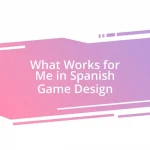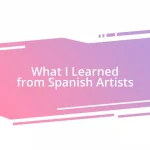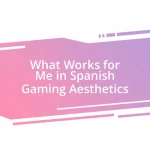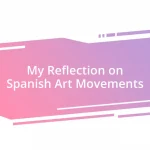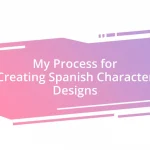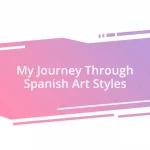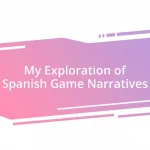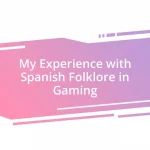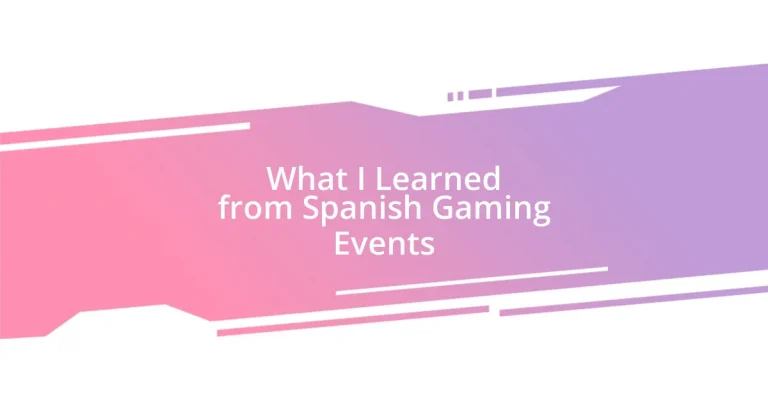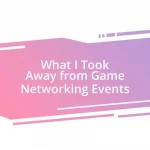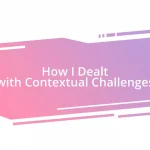Key takeaways:
- Spanish gaming events combine culture, community, and competition, providing a festival-like atmosphere that showcases both local and global gaming innovations.
- Networking at these events leads to valuable relationships, idea exchanges, and firsthand insights into industry trends, enhancing professional growth and creativity.
- Workshops and competitions not only refine technical skills but also foster collaboration, camaraderie, and a deeper understanding of storytelling and player engagement in games.
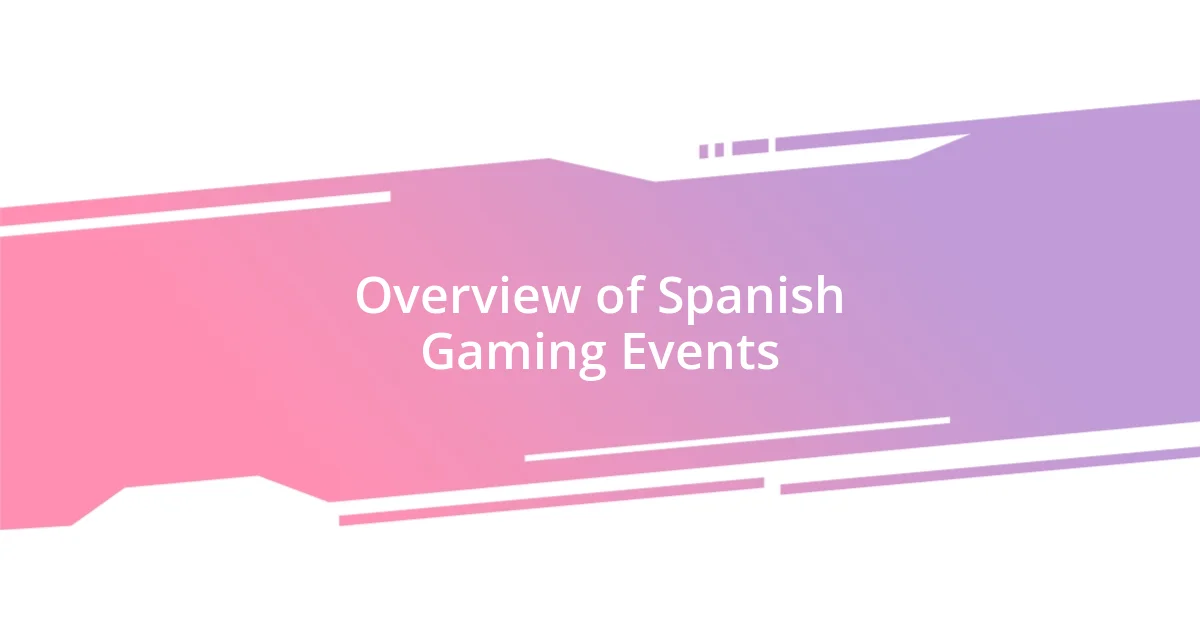
Overview of Spanish Gaming Events
Spanish gaming events are a vibrant confluence of culture, community, and competition. I’ve always been amazed by how passionate gamers in Spain express their love for gaming. This is evident in events like Madrid Games Week, where thousands gather, sharing their latest gaming victories and excitedly discussing upcoming releases. How often do you find yourself surrounded by such infectious enthusiasm?
In my experience, attending these events feels more like a festival than a convention. The atmosphere is electric, with live tournaments drawing huge crowds that cheer on their favorite players. I still remember the thrill of watching a professional gamer pull off an incredible move; it was as if the entire room held its breath—that shared excitement truly binds the community.
Moreover, these events are not just about gaming; they reflect Spain’s rich cultural tapestry. From local indie developers showcasing their creations to panels featuring renowned industry figures, there’s an ongoing dialogue about the future of gaming. It’s fascinating to see how traditional Spanish elements meld into modern gaming experiences, pushing boundaries while also evoking feelings of nostalgia. Have you ever thought about how culture influences gameplay? It’s an intriguing angle that I believe adds depth to our understanding of the gaming world.
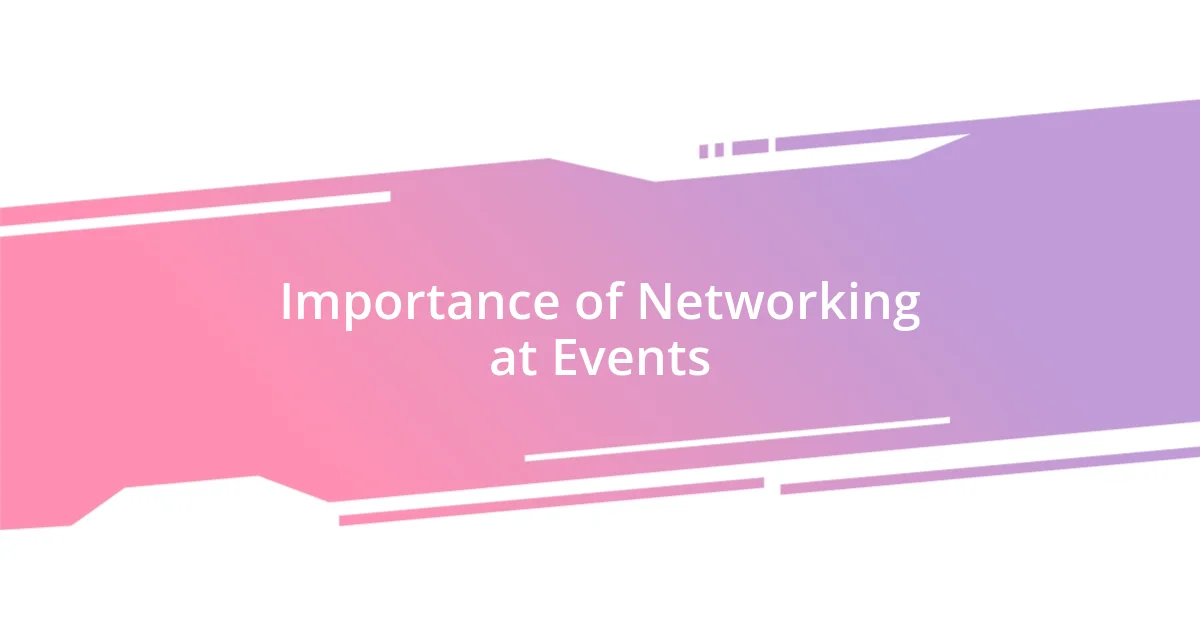
Importance of Networking at Events
Networking at events is invaluable for building relationships and exchanges that can propel your career forward. When I attended the Valencia Gaming Expo, I remember having meaningful conversations that led to collaborative projects down the line. It’s amazing how a single chat over lunch can open doors you never expected.
Another important aspect of networking is the ability to share ideas and gain insights from fellow gaming enthusiasts. During one event, I joined a roundtable discussion with emerging developers; their fresh perspectives really challenged my thinking in unexpected ways. Have you ever exchanged ideas and found your own creativity sparked by someone else’s passion? I certainly did. The conversations we have at gaming events often stay with us and inspire our future endeavors.
Lastly, networking also means staying updated on industry trends and innovations firsthand. At one gaming event, I bumped into a producer who shared insider information about upcoming releases and community engagement strategies. This kind of firsthand knowledge is not easily accessible through traditional channels. Connecting with industry professionals allows you to grasp what’s next, which I’ve found to be incredibly beneficial for my own projects.
| Aspect | Importance |
|---|---|
| Relationship Building | Fosters collaborations and partnerships |
| Idea Exchange | Encourages creativity through shared insights |
| Industry Knowledge | Provides firsthand information on upcoming trends |
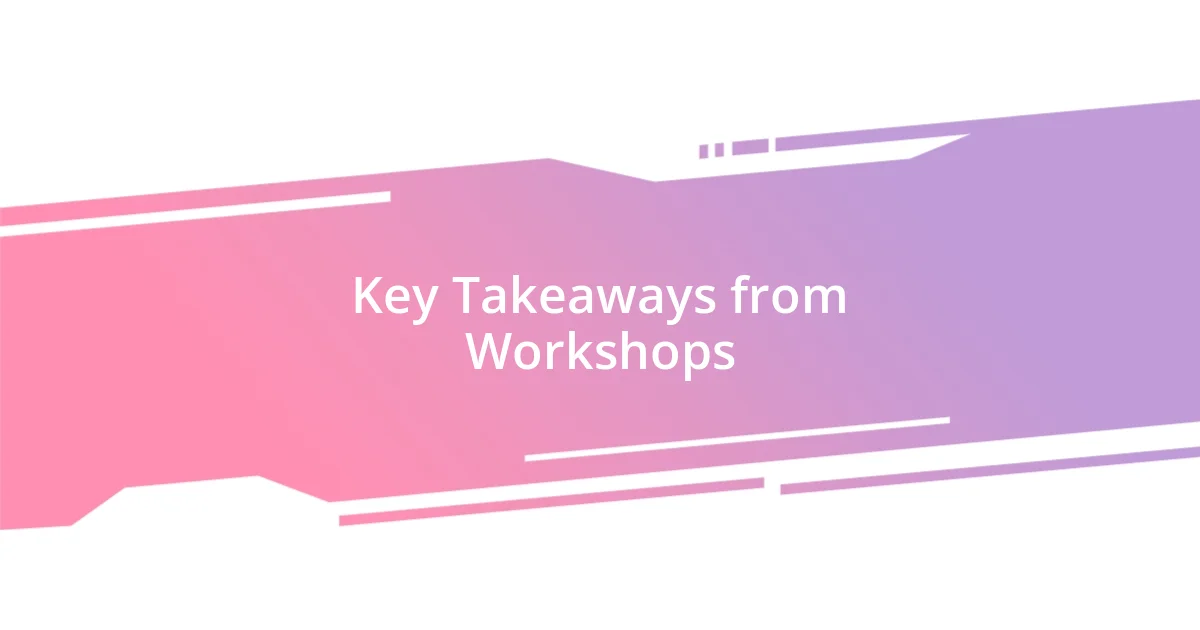
Key Takeaways from Workshops
Attending workshops at Spanish gaming events was a transformative experience for me. I remember sitting in one session where a game designer shared their creative process. Their passion was palpable, and it reminded me of the importance of storytelling in gaming. This workshop sparked a realization for me: the mechanics of a game only shine when they’re tied to a compelling narrative. It’s a simple yet profound lesson that I carry with me in my own projects; after all, who doesn’t want their audience to feel genuinely invested in the stories they create?
Here are some key takeaways from the workshops I attended:
- Skill Development: Workshops offered hands-on experience with game development tools that I had only heard about before, allowing me to expand my skill set.
- Design Principles: Learning about user experience (UX) design reshaped how I approach my projects, making me focus more on player engagement and emotional responses.
- Feedback Loops: Participating in critique sessions showed me the value of constructive criticism. I learned to embrace feedback as an essential tool for growth, rather than seeing it as just a review.
- Collaboration: The emphasis on teamwork in these workshops instilled in me the importance of working alongside others to bring diverse ideas to the table, enriching the final outcome.
These experiences took my understanding of the gaming industry to another level. Now, I always seek out opportunities to immerse myself in workshops, knowing they can ignite creativity and foster professional growth.
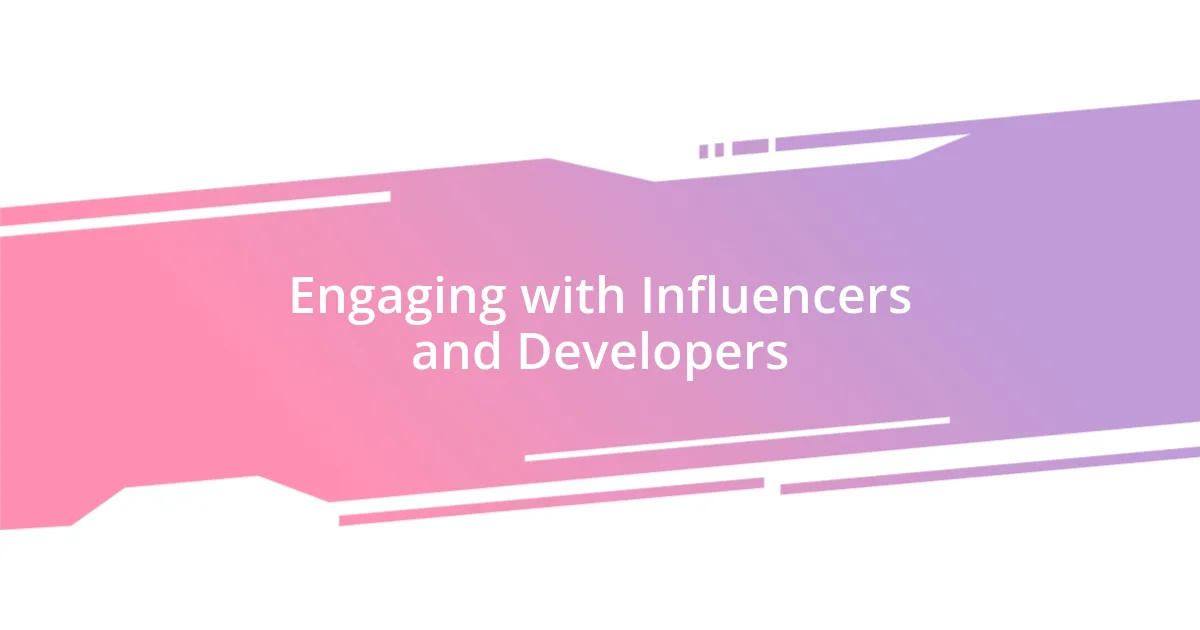
Engaging with Influencers and Developers
Engaging with influencers and developers at gaming events is like stepping into a vibrant tapestry of creativity. During one of my favorite conventions in Barcelona, I found myself in a casual chat with a well-known streamer. The energy was electric as we discussed the nuances between game mechanics and player engagement. Have you ever felt that spark of inspiration when someone shares their unique perspective? I certainly did, and it motivated me to rethink my own approach to gaming content.
I also had a chance to connect with a seasoned game developer at a small networking event. Their openness about the trials and tribulations of the industry was refreshing. Listening to their stories made me realize that every success comes with its own set of challenges. It’s fascinating how personal experiences shape the games we play and love. I left that conversation feeling better equipped to tackle my own projects—there’s nothing quite like learning from someone who has walked the path before you.
Furthermore, I discovered that engaging with these professionals can lead to unexpected collaborations. After sharing my ideas with an indie developer, we sparked an interest in creating a joint project, blending our distinct styles. How often do we miss out on opportunities simply because we hesitate to put ourselves out there? Taking that leap of faith and starting a dialogue can lead to projects that are far more rewarding than we initially imagined. Connecting with influencers and developers, I’ve learned, is not just about networking; it’s about weaving a community that fosters innovation and creativity.
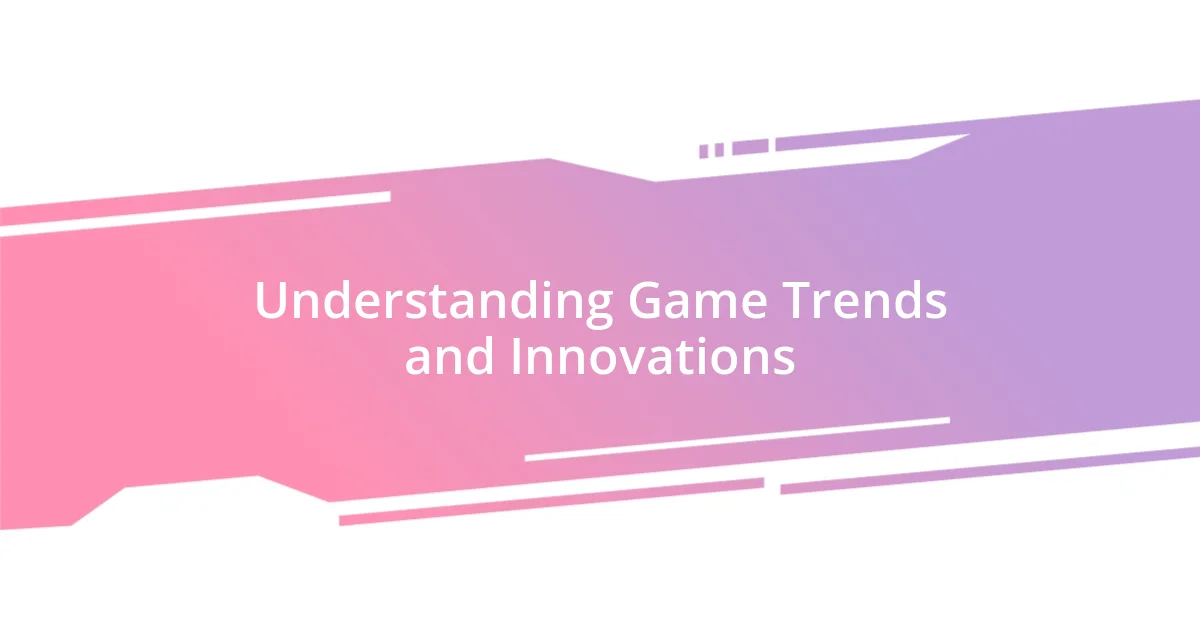
Understanding Game Trends and Innovations
Understanding game trends and innovations is like peeling back the layers of an onion—I always find something new and exciting. At one event, I attended a panel discussing the rise of immersive gameplay experiences. The speakers emphasized how technology, like virtual reality, is shaping the way we interact with games. For me, this was eye-opening; it underscored that the future of gaming lies not just in graphics but in creating environments that envelop players in a rich narrative from the moment they put on their headsets.
Innovation isn’t only about technology, though; sometimes, it’s about fresh ideas and perspectives. I remember a workshop where we brainstormed around the concept of sustainability in gaming. It was amazing to see how developers are now integrating eco-friendly themes into their narratives. This trend not only captivated my imagination but also made me reflect: how can we as creators contribute positively to social discussions? I believe that when we reflect current societal themes in our games, we aren’t just innovating; we’re connecting with our audience on a deeper level.
Lastly, I’ve noticed a surge in community-driven development, and it truly resonates with me. At one gaming event, I listened to a developer share their experience of utilizing player feedback loops to refine their game post-launch. It evoked a strong memory of a time when I sought input on a project of my own, which ultimately transformed it for the better. Have you ever been surprised by how much you can enhance your work through collective insights? This growing trend in collaboration between creators and their communities is refreshing and reminds me of the beautiful synergy that exists when we invite others into our creative processes.
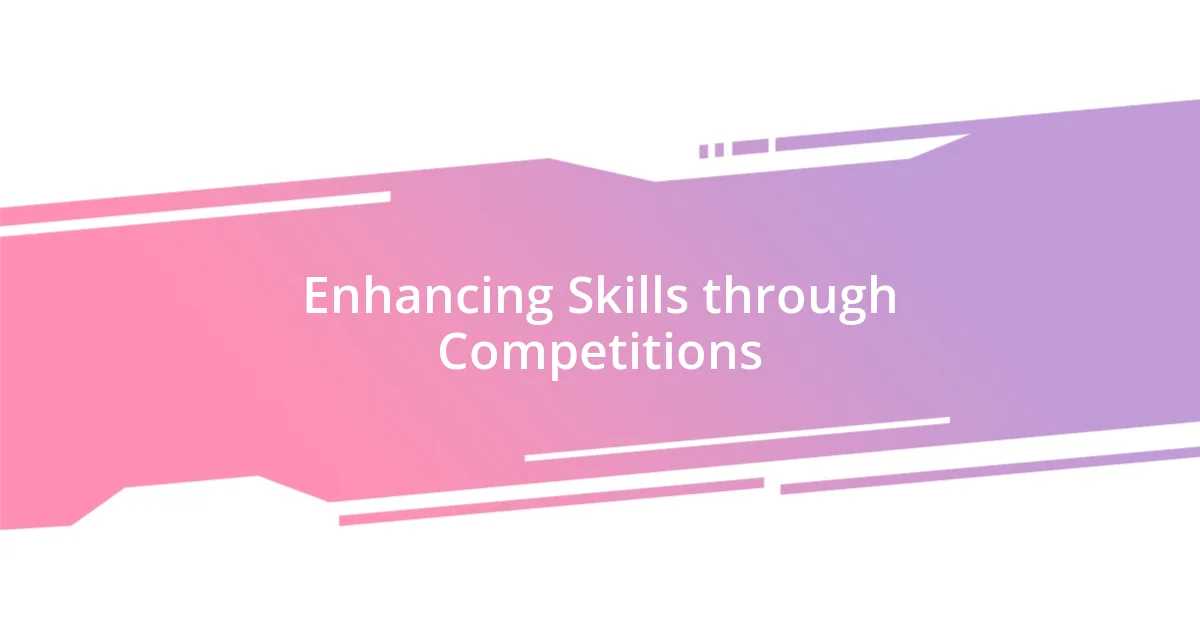
Enhancing Skills through Competitions
Competing in gaming events has transformed my understanding of skill development. I’ll never forget the adrenaline rush at a competitive tournament in Madrid where I faced off against players from diverse backgrounds. It wasn’t just about winning; it pushed me to adapt my strategies on the fly and think critically about my gameplay. Have you ever experienced that moment when you realize your abilities are being stretched in ways you didn’t expect? Those pressures can reveal hidden strengths and inspire a deeper level of gameplay.
What strikes me most about these competitions is the invaluable feedback you can receive. I recall a moment during a match where a fellow competitor pointed out a flaw in my approach that I hadn’t noticed. At first, I was taken aback—I’m competitive, after all! But as I reflected on their insights after the event, I recognized the value in constructive criticism. How often do we get a chance to refine our skills through direct observation of others? It’s a unique learning experience that can turn mere games into profound lessons in growth.
Beyond personal development, these competitions foster camaraderie and a sense of community. During a team game in a friendly competition, I bonded with my teammates over shared strategies and laughter. It was a reminder that while the thrill of competition is exhilarating, the friendships formed can last much longer than the event itself. Have you ever felt that sense of belonging when collaborating with others who share your passion? Engaging in these competitions isn’t just about enhancing one’s skills; it’s about creating connections that enrich both gaming and life.
